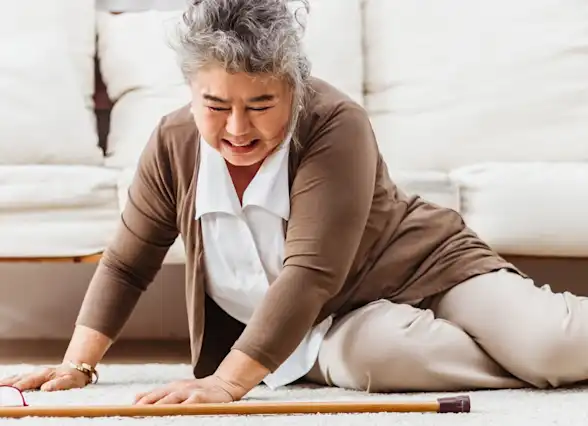Falls and Injuries, a Public Health Issue for Older Adults
Falls among older adults can lead to injuries such as fractures, head trauma, and other serious consequences, and may result in a loss of independence.
Get insurance benefits, legal documents, and medical records in one place

Helpful Highlights
Falls and injuries are a significant public health issue for older adults due to several reasons.
Given these factors, fall prevention is a critical public health priority for promoting the health, safety, and well-being of older adults.
Multifaceted approaches involving healthcare providers, community organizations, caregivers, and the older adults themselves are essential for preventing falls, reducing injuries, and improving the overall quality of life.
High incidence
Falls are the leading cause of injury-related deaths and non-fatal injuries among older adults. As people age, their risk of falling increases due to factors like changes in balance, muscle weakness, chronic health conditions, and medication side effects.
Serious consequences
Falls can have serious consequences for your loved one, including fractures (especially hip fractures), head injuries, soft tissue injuries, and lacerations. These injuries can result in hospitalization, surgery, long-term disability, loss of independence, and decreased quality of life.
Fear of falling
After experiencing a fall or fearing the risk of falling, your loved one may become less physically active and more socially isolated, leading to a decline in physical function, loss of independence, and poor overall health outcomes. Fear of falling can actually increase the risk of falls and injuries.
Modifiable risk factors
Many risk factors for falls among older adults are modifiable (can be changed) through public and private health interventions. These include environmental hazards (such as uneven surfaces, poor lighting, and lack of grab bars), medication management, vision impairment, muscle weakness, and balance problems. Addressing these risk factors can help prevent falls and reduce the associated injuries.
Aging population
The aging population in the United States and other countries worldwide underscores the importance of addressing falls and injuries among older adults. As the population ages, the number of older adults at risk of falling is expected to increase, making fall prevention efforts even more crucial for public health.
Economic burden
The economic burden of falls among older adults is substantial, both for individuals and society as a whole. Medical costs associated with fall-related injuries, including hospitalizations, rehabilitation, and long-term care, can be significant. Additionally, falls can lead to indirect costs such as lost productivity, increased burden on you, and reduced quality of life for your loved one and your family.
No content in this app, regardless of date, should ever be used as a substitute for direct medical advice from your doctor or other qualified clinician.
Get more support and guidance on insurance benefits, medical records and legal forms.
Helpful brings together your insurance benefits, legal documents, and medical records in one personalized place — so you always know what you have, and never have to search again.

Technology for Health Tasks. Mental Health for the Tough Stuff.
Helpful connects your medical records, insurance, and caregiving tasks automatically. And when you need more than logistics, a therapist is here to guide you.
In-Network and Covered
For Individuals, Couples and Families
HIPAA Compliant, Data Stays Private


Healthcare Tasks Simplified

From syncing records to spotting drug interactions, Helpful does the heavy lifting, turning complex health info into clear tasks and showing you benefits you can actually use, giving you clarity and control over your care.

In-Network Mental Health

Our licensed therapists are here to support you and your loved ones through stress, burnout, and life’s hardest moments, with an inclusive, compassionate approach that works with most insurance plans.

Create Legal Documents

Plan ahead by creating will, trusts, advance directives and more, that ensure your wishes are honored in the event you can’t speak for yourself -with Helpful guiding you every step of the way.